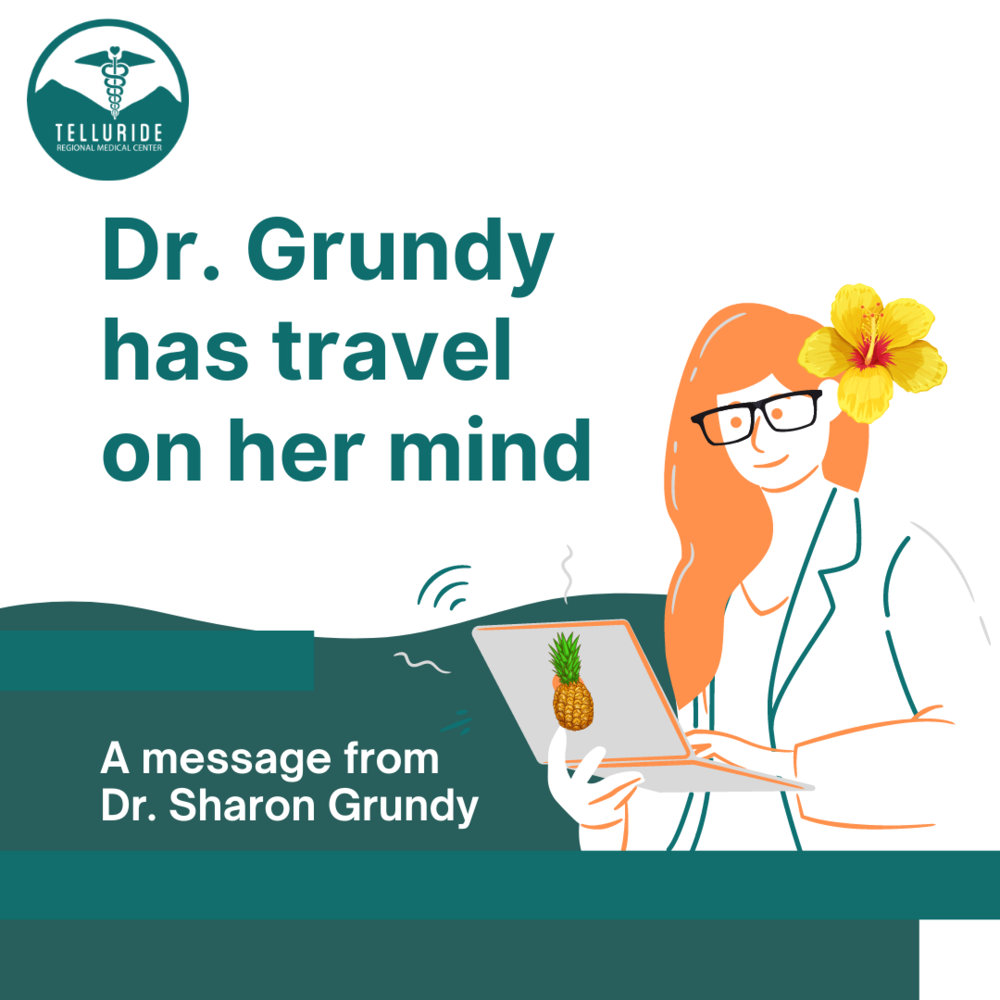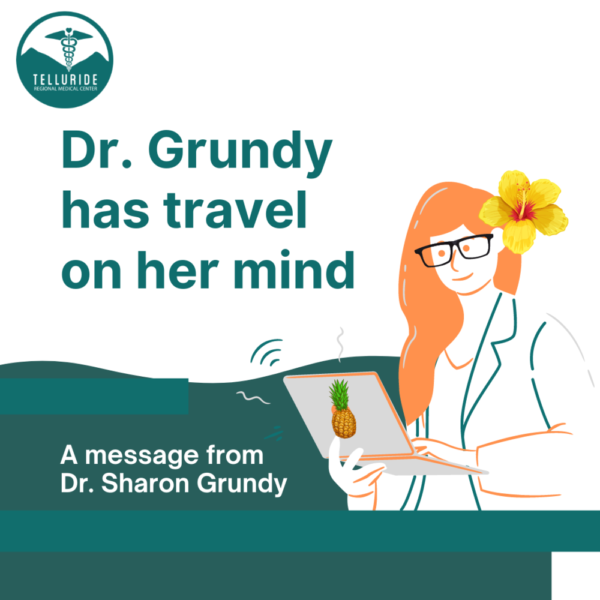
24 Feb Telluride Med Ctr: Dr. Grundy, Travel On Her Mind! And You?
Register for vaccine here.
Support Telluride Medical Center’s COVID Fund here.
For more information surrounding COVID resources, testing and the concern form, visit here.
For more information surrounding the state’s COVID-19 dial, visit here.
For additional Telluride Medical Center (TMC) information on COVID, go here.
TMC would love to hear from you about a topic for the next Medical Moment! Send your questions here.
Scroll down for vital information about travel from Dr. Sharon Grundy.

It has been a long 12 months.
I’ve got travel on my mind. I’m thinking maybe you do too.
As we approach Closing Day at the Telluride Ski Resort, spring break and off-season, there is much to celebrate: We succeeded at hosting the visitors who fuel our economy; our children go to school (for the most part); and our local COVID-19 cases continue to decline, accompanied by low numbers of hospitalizations.
And yet, travel remains a high-risk activity.
I’m writing to encourage the Telluride community to make thoughtful decisions that will lead to a healthy, happy and safe off-season.
When deciding if and where to travel, please be mindful as to how you will get to your destination and who it is you will see. Stay flexible and prepared to modify plans should variables change.
Some considerations:
• How many people will you interact with?
• Can you maintain at least 6 feet of space between you and others?
• Will you be outdoors or indoors?
• What’s the length of time that you will be interacting with people?
When to delay or cancel travel/plans
• Delay or cancel travel if you or incoming guests have symptoms of COVID-19 or have been exposed to someone with COVID-19 in the last 14 days.
• If anyone in your party has had close contact with a known COVID-19 case, you will need to stay home to monitor for symptoms.
Know before you go
• If you are traveling abroad, check travel restrictions for your destination and protocols for returning to the US. The US Dept. of State hosts resources for checking the travel status for your destination.
• If you are traveling within the US get familiar with the local public health orders. Local restrictions may impact your stay and restaurant, activities and lodging may be impacted.
• Healthcare capacity is also a consideration. Understanding the medical capacity and ability to get care in a region is important.
• Understand how to get tested for COVID-19 before, during or after travel. Few countries accept rapid testing. The US requires a PCR test within 72 hours of your return, or proof of COVID-19 vaccination.
• Be sure to check with your school before traveling to understand what the expectations are for returning to in-person school after travel.
Traveling to a developing country, or a region experiencing a high level of COVID-19, or new variants of COVID-19:
• Consider limiting this type of travel. You may be at risk for contacting COVID-19 and you also may bring COVID-19 to a region that does not have a health care system that can support patients requiring hospitalization.
Visiting family that is not immunized and has high risk medical conditions:
Start with planning ahead by asking the family if they are comfortable with your visit and discuss plans for limiting risks. If there are people who have high risk conditions for COVID-19 you should consider quarantining before visiting and getting tested before your visit. High risk conditions here.
I’m fully vaccinated, can I travel anywhere?
If you’ve received both doses of a COVID-19 vaccine, and two weeks have passed since your second dose, you have good immunity and are unlikely to develop symptoms, become severely ill or die from COVID-19. However, we still don’t know the extent to which these vaccines convey sterilizing immunity, the type of immunity that prevents COVID-19 from establishing an infection.
Sterilizing immunity differs from effective immunity in that the latter can prevent illness, but still lead to asymptomatic infection. In other words you can still get COVID-19 and spread it to others.
If you are visiting family who are fully immunized, and you are fully immunized, you have a green light! However, if anyone develops symptoms, take precautions and get tested.
In general, the more people you interact with, the more closely you interact with them, and the longer that interaction, the higher the risk of COVID-19 spread.
Maintain social distancing
• Limit the number of people you interact with and ensure you keep safe distances (at least 6 feet) between you when possible and if not in the same household.
• Visit with your friends and family outdoors, when possible. If this is not feasible, make sure the room or space is well-ventilated (for example, open windows or doors) and large enough to accommodate social distancing.
• Arrange tables and chairs to allow for social distancing. People from the same household can be in groups together and don’t need to be 6 feet apart from one another.
• Consider activities where social distancing can be maintained, like sidewalk chalk art or yard games.
• Try to avoid close contact with people you meet along the way. For example, don’t shake hands, elbow bump, or hug. Instead wave and verbally greet them.
• Avoid others who are not wearing masks or ask others around you to wear masks.
• Consider keeping a log of people you have made contact with. That will help with contact tracing should someone become sick.
• Limit the time you have close contact with visitors to less than 15-20 minutes as much as possible.
Wear masks
Masks prevent people from getting and spreading the virus, especially those who may not know they have it.
Wash hands often
• Everyone should wash their hands with soap and water for at least 20 seconds at the beginning and end of the visit and whenever you think your hands may have become contaminated.
• If soap and water are not readily available, such as with outdoor visits or activities, use a hand sanitizer that contains at least 60% alcohol. Cover all surfaces of your hands and rub them together until they feel dry.
• Remind guests to wash or sanitize their hands before serving or eating food.
• Use single-use hand towels or paper towels for drying hands so visitors do not share towels. Have a no-touch trash can available for guests to use.
Limit contact with commonly touched surfaces or shared items
• Encourage your guests to bring their own food and drinks. And likewise, if you’re traveling, arrive with your own provisions.
• Clean and disinfect commonly touched surfaces and any shared items between use.
• If you choose to use any shared items that are reusable (e.g., seating covers, tablecloths, linen napkins), wash, clean and sanitize them after the event.


Sorry, the comment form is closed at this time.